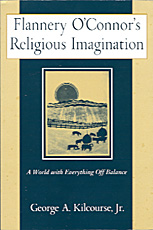Flannery O'Connor's (1925-1964) Southern short stories and novels bear the mark of her Catholicism. She once commented on her faith's relationship to her writing: "My own feeling is that writers who see by the light of their Christian faith will have, in these times, the sharpest eyes for the grotesque, for the perverse, and for the unacceptable." Her fiction illustrates this perspective. Few writers have demonstrated a keener sense of evil, a greater degree of stringent control in handling perversity, or a more acute vision of chaos and rebellion in this world.
In this religious interpretation of O'Connor's two short story collections and two novels, George A. Kilcourse, Jr., a professor of theology at Bellarmine University and a priest of the Archdiocese of Louisville, focuses on the important role of grace in her imaginative vision of reality. The author of Ace of Freedoms: Thomas Merton's Christ points to O'Connor's deep respect for the mysteries of personality and the exigencies of living in a post-Christian world. Her eccentric and often grotesque characters struggle with meaning as they confront the abyss within themselves. And oftentimes, it is violence that works as a catalyst to "return my characters to reality and prepare them to accept their moment of grace."
O'Connor's unflinching view of human fallibility is matched by her marveling at the wondrous liberating power of God's grace. Readers familiar with the theology of Romano Guardini and the literary insights of William F. Lynch will profit by Kilcourse's discussion of their influence on O'Connor's religious imagination.
